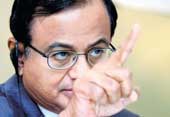 |
Sold mutual fund units worth Rs 2 lakh in small lots at a tidy profit and don’t intend to declare this in your income tax returns to avoid paying capital gains tax? Split your fixed deposits into small lots in different banks to escape having tax on the interest deducted by the banks?
Beware, the taxman is watching you — as one tax dodger found out. He had amassed property worth Rs 1.5 crore but claimed an annual income of Rs 5 lakh in his tax returns. The government will soon crack down on him. Indeed, the tax authorities have, as finance minister P. Chidambaram warned at a press conference in October 2005, “more information than people think we have”.
That’s largely because the government has set up what it calls the Tax Information Network (TIN), a three-part online system that keeps a watch on the tax you paid, the claims you make as well as your financial transactions and those of companies.
It is also resorting to other instruments in its tax evasion armoury:
The banking cash transaction tax (BCTT). Banks have to deduct 0.1 per cent from all cash withdrawals of Rs 25,000 or more by individuals from current accounts.
Banks file monthly returns of the tax they collect detailing the number of transactions of different sums. Any abnormal patterns — too many high value withdrawals from banks within a certain area, for example — sends the investigation arm of the income tax department to the banks for more information. Such investigations have helped detect bogus purchases of Rs 380 crore by an account holder of a Delhi bank and the issue of fake sales bills of Rs 204 crore in another case.
 |
Banks are also required to report to the government all fixed deposits that are exempt from the tax (cases where the annual interest is below Rs 5,000). So even if you earn just Rs 1,000 as interest on your fixed deposit, the government will know.
A tax on the sale and purchase of shares, units of an equity growth mutual fund and sales of derivatives. Called the securities transactions tax, this is collected by the stock exchange and helps the government keep tabs on your money trail.
The most powerful weapon the taxman has is, of course, the TIN. This is run by the Mumbai-based National Securities Depository Ltd (NSDL) and is linked to the income tax department’s own all-India network which connects 745 offices in 510 cities.
TIN has three components: the Online Tax Accounting System (OLTAS) which gets data on the actual tax paid; the e-TDS which enables companies to file their tax deducted at source returns online; and the so-called Annual Information Return (AIR), under which seven high-value financial transactions are reported to the tax authorities. The information on the first two is matched and put in annual tax statements of individuals (55 lakh accounts, in December 2006). The income tax man can access this information when checking tax returns. AIR information is available to him for further analysis.
Banks, mutual funds, registrars of property, companies that issue bonds, shares and debentures and the Reserve Bank of India (RBI) have to file AIRs on cash deposits of Rs 10 lakh and more a year, credit card purchases worth Rs 2 lakh a year, purchases of corporate bonds and debentures and RBI bonds worth Rs 5 lakh a year, the sale and purchase of mutual fund units worth Rs 2 lakh a year, of shares worth Rs 1 lakh a year and property worth Rs 30 lakh a year. By March 31, more financial transactions will be covered.
The AIR returns have names and addresses. So even if you haven’t quoted your PAN number for any of these transactions, you’ll be caught. Don’t also think of splitting your credit card purchases across different cards to escape the Rs 2 lakh limit. The tax authorities have been working on ways to collate information on cards that belong to the same person. Banks have been asked to explain huge credit card transactions from one address.
In its first year (2004-2005), AIR brought in information on 17 lakh transactions involving Rs 14 lakh crore. In the second year, it got data on 15 lakh transactions to the tune of Rs 22 lakh crore.
Needless to say, taxpayers holler that the government is being overly intrusive. “This is a violation of my privacy,” declares Ajit Kumbhat, president of the Chennai-based All India Tax Payers Association.
Kumbhat may have a point. AIRs are first filed with private facilitation centres to verify whether the information conforms to the format. Finance ministry officials, however, pooh-pooh these fears. Proper procedures are in place, including non-disclosure agreements and split passwords. Even within the tax administration, access is given on a need-to-know basis and one assessing officer cannot view the records of an individual who is under the jurisdiction of another.
Public finance experts applaud these measures. “In a system rife with evasion, it is essential to build up an information system,” says M. Govind Rao, director of the Delhi-based National Institute of Public Finance and Policy.
Yet the system isn’t glitch free. Rohit Khanna, a partner at the New Delhi-based firm of chartered accountants Khanna, Gulati Associates, points out, “Not all banks are geared up for computerisation.” Since many state-owned bank branches are not computerised, many of them haven’t filed information on fixed deposits that escape tax (the interest on them is below Rs 5,000 a year.) A large number of tax deductors aren’t in the government’s database because no directory exists.
But the taxman is working on all this. By 2009, a fully e-enabled tax administration system will be rolled out. In the meantime, huge databases are quietly being built. So pay heed to Chidambaram’s warning: “The best way to live is with your head held high. You can’t get away from paying your taxes.”










